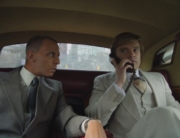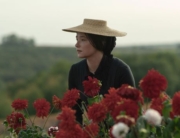
Protagonists in movies certainly don’t have to be likeable, but is stiff-necked, high-handed, and wintrily remote any way to go through life (or a film)? Acclaimed director Agnieszka Holland has based her prickly, tight-lipped antihero on a historical figure, Jan Mikolasek, and takes us through his epic life and eventual downfall. Mirroring the doctor at the heart of the story, the journey demonstrates great talent, but feels monomaniacal and relentless.
“My life’s mission has been to fight illness with nature’s weapons,” declares Mikolasek (Ivan Trojan). The gifted Czech herbalist diagnoses illness by assessing the state of people’s urine, so a lot of the running time is taken up with scenes of the healer peering at vials of variously discolored piss (the prominent presence of pee and recitations of the medicinal powers of goose fat and dandelions may coax a titter out of the less high-minded among its viewers). Throngs of people line up clamoring for Mikolasek’s services. It seems that the homeopath has treated just about everyone for one ailment or other; some patients will cross his path again in fateful ways.
Holland cuts Mikolasek’s life up in flashbacks. Drawn to nature’s healing powers from an early age, he apprentices with a local woman rejected as a witch by narrow-minded villagers. He endures the First World War and flirts with Nazi collaboration in order to survive the Second. Suspicion and envy always swirl around the herbalist. It will take the gray postwar communist regime to finally bring him down—his forbidden affair with his handsome, married, and much younger assistant (Juraj Loj) constitutes an affront Stalinist Czechoslovakia will not accept.
Charlatan creates an air of poetic isolation around Mikolasek by filming him through frames and prisms, backlighting him so his expressions are a mystery. The technique is artful, but the effect distances us from a man already difficult to warm up to: the young Mikolasek savagely kills a sackful of kittens in a gratuitously violent scene. Moments abound of Mikolasek correcting, lecturing, or withholding something from others. For someone who in principle lives to heal people, the herbalist doesn’t seem to like actual people very much, and it comes as no surprise to see him fall into vengeful hands.
His proud cussedness undermines the political point that Holland wants to make about the evils of totalitarian tyranny—one can easily imagine the imperious Mikolasek landing in trouble in more open political systems than communism. In a thoughtful way, the film opens up the question of when pride crosses the line between noble pursuit and fatal blind spot. On a more practical level, are herbal poultices really a worthwhile hill to die on?
Charlatan is involving and eventful, but it proceeds toward its lead character’s end with a sense of grim inevitability. We’re sorry to see the doctor go, but not heartbroken.






Leave A Comment